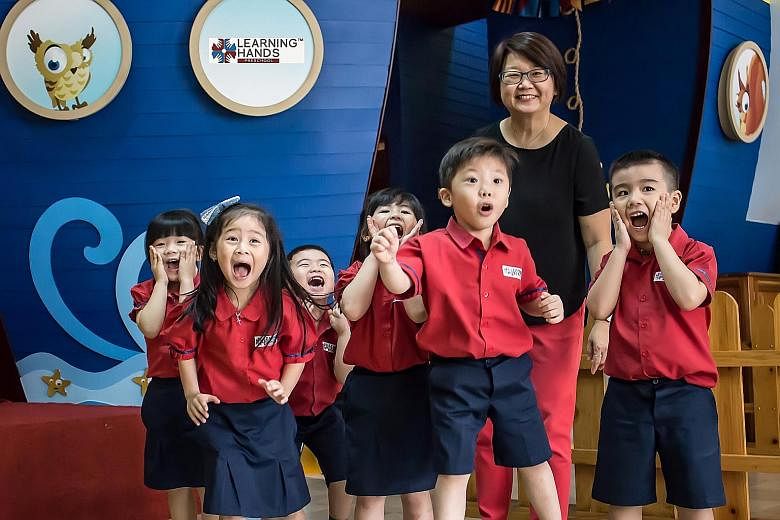When education consultant Josephine Tan moved to Jakarta 12 years ago to work at a Singapore-run pre-school, she got a culture shock. "The pace was really slower, and I couldn't cope. Why was everybody so relaxed?" she tells The Sunday Times. "But the space and opportunity to thrive and make mistakes were fantastic."
Thrive she did. Today, she runs her own pre-school, Learning Hands, in North Jakarta. Set up two years ago with an Indonesian investor, it offers a Singapore-style curriculum to middle-class Indonesians, who pay $4,000 a year in fees.
Singapore is the largest investor in Indonesia, with its companies pumping in US$7.1 billion (S$10 billion) in the first nine months of last year. While many big companies are represented, there are also many small players like Ms Tan, 49.
She put down $60,000 of her savings, hiring Singaporean pre-school teachers to craft a programme which she then tweaked to suit the Indonesian learning environment.
Ms Tan trained 10 staff, including teachers, and designed the school uniforms and even the school badge. The investor, who had approached her to start a Singapore-style curriculum, provided the facilities, footed the operating overheads and dealt with red tape.
"I did have fear initially. What if I could not pull through? But fear is not the word to live by. If I could help others market their brand, why can't I make my own?" she says.
-
Tips
-
...FROM JOSEPHINE TAN
•Get out of your comfort zone. Uprooting and living in Indonesia would be your best investment.
•Be flexible and embrace change.
•Each island in Indonesia has its own culture, and deals with issues in its own way.
•Learn Bahasa Indonesia. It will be an advantage to communicate with Indonesians in their own language.
...FROM IE SINGAPORE
• Beyond Jakarta and the Riau Islands, regions such as Central and East Java, Sumatra, Sulawesi and Kalimantan are rich in resources and offer manufacturing potential. Cities such as Bandung, Yogyakarta and Makassar offer opportunities in the urban development and consumer sectors.
• A growing middle-class creates demand for healthcare, food, retail and education services, which Singapore is known for. High mobile phone penetration presents opportunities in financial technology and digital payment solutions.
• Cultural differences mean Singapore firms need to take time to build relationships before starting a business deal. They should not expect to strike a deal in the first few meetings. They should also be sensitive to their surroundings.
After all, she had proven her mettle when roped in to turn around an Indonesian-run primary school in Bandung, Sekolah Bina Persada, that was on the verge of closing due to the 2008-2009 global financial crisis.
That was her second job, after quitting the pre-school in Jakarta.
She tailored a Singapore-style curriculum for the students, who today study English and Mandarin on top of Bahasa Indonesia, use Singapore textbooks and sit for Cambridge IGCSE examinations.
The school now offers both primary and secondary education, with 300 students and 40 teachers. Ms Tan is executive principal.
Besides the primary school, she also managed another Singapore-run pre-school in Bandung, but gave up the latter to focus on Learning Hands.
On the formula for her success, she says: "You bring in the Singapore element, but you have to localise it in order for you to do it right.
"The mindset of the Singaporeans is, 'Oh, it has to be run this way because it is run this way in Singapore', but they forget that not all countries have the same education system and facilities."
At Learning Hands, teachers focus on teaching in a fun way. The 70 pupils are taught English, Mandarin and Bahasa Indonesia and go on frequent learning trips around the capital. "We take them to Domino's Pizza and Dunkin' Donuts to learn cooking. Experts in the community are also their teachers, not just the school," she says.
"We get them to post letters at the post office and invite the 'delman' to the school so the children can experience something different from sitting in a car," she says, referring to a horse-drawn carriage.
Ms Tan hopes to find more investors so she can open more pre-schools in Indonesia. She attends business meetings to expand her network and meets local teachers and parents to understand their needs and fine-tune her curriculum.
The single woman worries about her elderly mother in Singapore, but believes entrepreneurs must be in countries where they do business.
"Indonesia is big. There are still many untapped places," she says. "I hope by bringing Learning Hands Preschool around Indonesia, it would also give me the opportunity to plant the Little Red Dot around for people to know Singapore."


